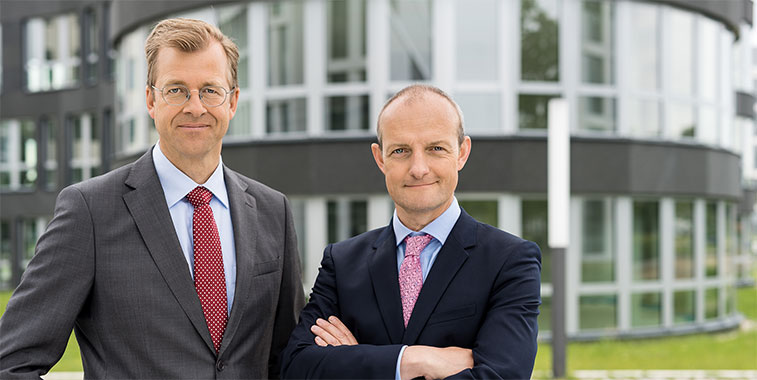AviAlliance is one of the world’s leading industrial airport investors and managers. It has built a complementary, balanced portfolio of airport holdings, including Athens, Budapest, Düsseldorf, and Hamburg. AviAlliance’s Managing Directors Holger Linkweiler and Gerhard Schroeder outlined the company’s main goals and key investment criteria to Marta Dimitrova.

AviAlliance’s Managing Directors Gerhard Schroeder and Holger Linkweiler are positive about the future of the company. “We continuously review new investments and if we find the right opportunity we act. With regard to new acquisitions, we feel confident. There are several interesting projects.”
Airports are attractive assets that provide a stable return. That is why privatisation and airport investments increasingly attract interest among investors. “The manner in which the sector has managed various crises in the last few years has shown that airports are a robust and attractive asset class,” says Holger Linkweiler, Managing Director, AviAlliance.
AviAlliance, one of the world’s leading industrial airport investors and managers, was founded in 1997 under the name of HOCHTIEF AirPort and has systematically built up a complementary, balanced portfolio of airport holdings. It currently holds stakes in Athens, Budapest, Düsseldorf, and Hamburg airports. “In the first half of 2016, our four airports performed very well,” comments Gerhard Schroeder, Managing Director, AviAlliance. “The number of passengers going through Athens, Budapest, Düsseldorf, and Hamburg airports totalled 31.9 million – a 5.5% increase compared with the first six months of the prior year.”
AviAlliance focuses on airports with stable frameworks and the potential for long-term growth, which perfectly describes the four airports the company has invested in. For instance, Athens International Airport, which in March celebrated its 15th anniversary. “Athens International Airport is a nucleus of economic development, upgraded tourism services and job creation in the country. Despite the economic crisis in Greece, Athens International Airport has grown passenger numbers from 12.9 million to 18.1 million in the past four years,” Linkweiler explains. “And the airport is not just successful in business terms, it is also aware of its social responsibility. Recently, for example, it re-triggered the Youth Employment Programme which it had initiated in 2014. This offers 100 young people the opportunity to do paid work at the airport for a period up to six months, providing them with the necessary working experience and on-the-job training to support their future professional steps.”
Other projects that show AviAlliance’s determination to boost growth in its airports include Budapest Airport’s ‘bud:2020’ development programme. The airport is going to invest €160 million over the next five years. One of the most important elements of the programme is the new Pier B. Budapest Airport has also been commended on a number of occasions for the quality of its services. In 2016, for the third time in succession, it has been honoured as the best airport in the Eastern European region by receiving the Skytrax World Airport Award.
Düsseldorf Airport, meanwhile, has submitted an application to extend its capacity in order to be able to operate in a more demand-oriented way. The airport is located in one of the strongest economic regions in Europe, with 18 million people living within a 100km radius. AviAlliance considers it essential for Düsseldorf Airport to be granted scope for growth to ensure that it can keep pace with international developments and fully meet the mobility requirements of people and businesses.
Hamburg Airport is also making itself fit for the future and will invest €120 million in infrastructure modernisation in the period to 2020.
Key investment criteria
Airports that have not yet reached their full potential and could offer substantial scope for development are AviAlliance’s main target. Its investment criteria are clear: Good growth potential, an attractive catchment area, scope for infrastructure and space optimisation, potential for non-aviation business, and the possibility for improvements to operational and business performance. AviAlliance is a hands-on investor, supporting the local management with operational and financing know-how. It is primarily interested in long-term engagements and brings an integrated approach, bundling aviation, non-aviation business, master planning and financing expertise. AviAlliance is a wholly-owned subsidiary of PSP Investments, one of the largest Canadian pension funds, which has an extremely strong financial foundation.
Looking ahead, AviAlliance is confident about new acquisitions and future projects. “We keep a close eye on the market and are in a position to take advantage of any favourable opportunities that arise,” says Linkweiler. “We continuously review projects and potentials. And if we find the right opportunity, we act. With regard to new acquisitions, we feel confident,” Schroeder adds. “There are currently several interesting projects. But an acquisition is just the beginning. It has to be followed by the long-term process of developing the project into an enterprise that is successful in terms of its business and its operational performance – for the benefit of its owners and of all the stakeholders.”







